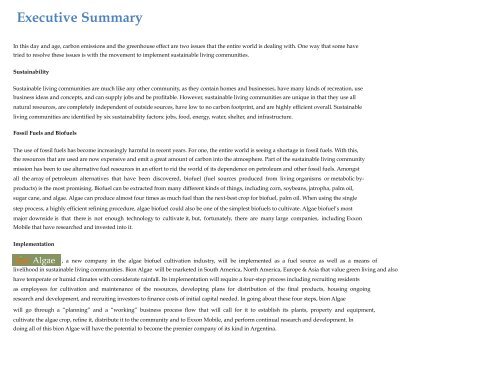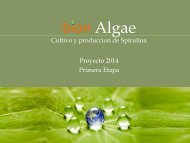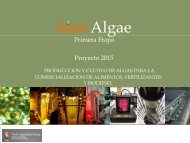bion Algae
Algae farmed, grown and harvested in Argentina
Algae farmed, grown and harvested in Argentina
Create successful ePaper yourself
Turn your PDF publications into a flip-book with our unique Google optimized e-Paper software.
Executive Summary<br />
In this day and age, carbon emissions and the greenhouse effect are two issues that the entire world is dealing with. One way that some have<br />
tried to resolve these issues is with the movement to implement sustainable living communities.<br />
Sustainability<br />
Sustainable living communities are much like any other community, as they contain homes and businesses, have many kinds of recreation, use<br />
business ideas and concepts, and can supply jobs and be profitable. However, sustainable living communities are unique in that they use all<br />
natural resources, are completely independent of outside sources, have low to no carbon footprint, and are highly efficient overall. Sustainable<br />
living communities are identified by six sustainability factors: jobs, food, energy, water, shelter, and infrastructure.<br />
Fossil Fuels and Biofuels<br />
The use of fossil fuels has become increasingly harmful in recent years. For one, the entire world is seeing a shortage in fossil fuels. With this,<br />
the resources that are used are now expensive and emit a great amount of carbon into the atmosphere. Part of the sustainable living community<br />
mission has been to use alternative fuel resources in an effort to rid the world of its dependence on petroleum and other fossil fuels. Amongst<br />
all the array of petroleum alternatives that have been discovered, biofuel (fuel sources produced from living organisms or metabolic byproducts)<br />
is the most promising. Biofuel can be extracted from many different kinds of things, including corn, soybeans, jatropha, palm oil,<br />
sugar cane, and algae. <strong>Algae</strong> can produce almost four times as much fuel than the next-best crop for biofuel, palm oil. When using the single<br />
step process, a highly efficient refining procedure, algae biofuel could also be one of the simplest biofuels to cultivate. <strong>Algae</strong> biofuel’s most<br />
major downside is that there is not enough technology to cultivate it, but, fortunately, there are many large companies, including Exxon<br />
Mobile that have researched and invested into it.<br />
Implementation<br />
, a new company in the algae biofuel cultivation industry, will be implemented as a fuel source as well as a means of<br />
livelihood in sustainable living communities. Bion <strong>Algae</strong> will be marketed in South America, North America, Europe & Asia that value green living and also<br />
have temperate or humid climates with considerate rainfall. Its implementation will require a four-step process including recruiting residents<br />
as employees for cultivation and maintenance of the resources, developing plans for distribution of the final products, housing ongoing<br />
research and development, and recruiting investors to finance costs of initial capital needed. In going about these four steps, <strong>bion</strong> <strong>Algae</strong><br />
will go through a “planning” and a “working” business process flow that will call for it to establish its plants, property and equipment,<br />
cultivate the algae crop, refine it, distribute it to the community and to Exxon Mobile, and perform continual research and development. In<br />
doing all of this <strong>bion</strong> <strong>Algae</strong> will have the potential to become the premier company of its kind in Argentina.









